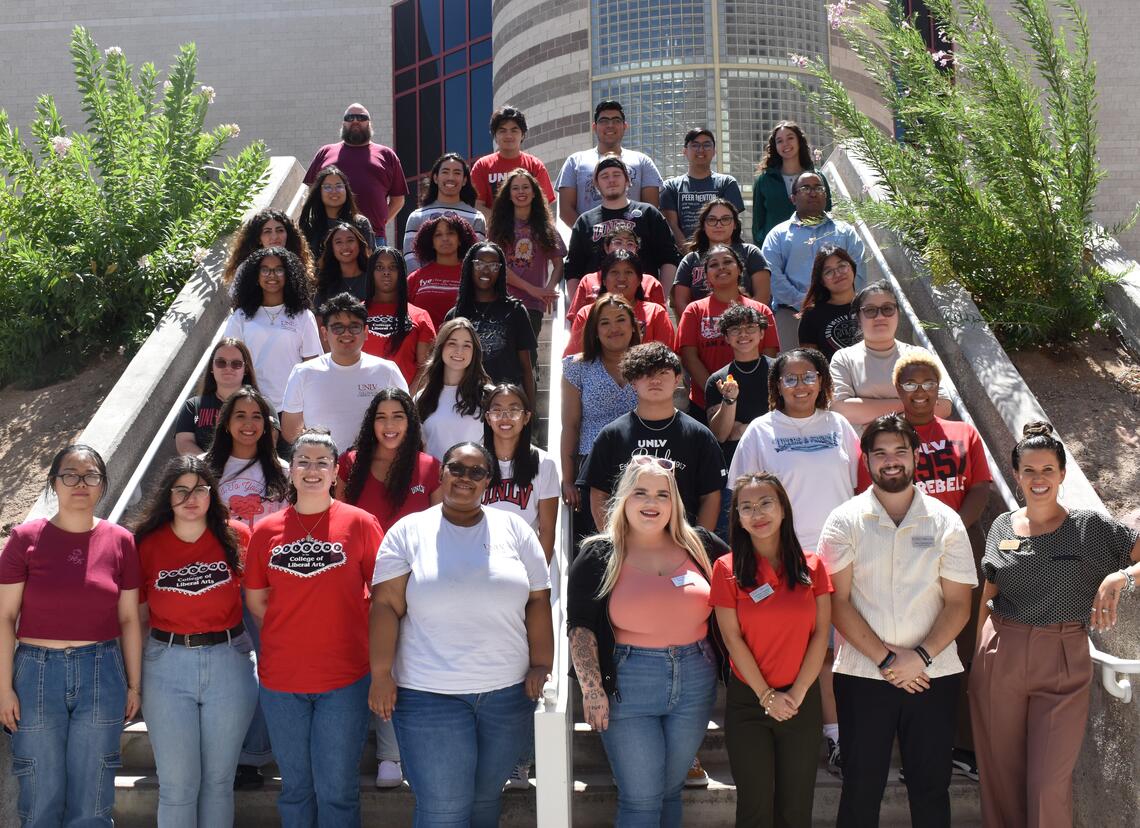
COLA peer mentors gather for a group photo during their annual planning retreat.
COLA peer mentoring fosters growth, connection, and the courage to belong.
The College of Liberal Arts (COLA) at UNLV is home to six distinctive peer mentoring programs — each thoughtfully designed to empower students through connection, guidance, and community. These initiatives support a range of student experiences, offering tailored mentorship that fosters belonging and academic confidence. Whether helping first-year students navigate their transition to college or connecting upper-division students with alumni mentors, COLA’s mentoring programs illuminate pathways toward growth, purpose, and success, organizers say.
The First Spark
It often begins in silence. A first-year student steps into the classroom, undeclared and uncertain, the campus a maze of unknowns. That silence breaks during a first conversation — an exchange not of information, but of recognition. In the Exploring Majors First-Year Seminar, which became part of COLA in 2024 after transferring from the Academic Success Center, this recognition has become a turning point for many. The program ensures that every undeclared student receives one-on-one guidance from trained peer mentors.
Natalie Martinez, a lead peer mentor of the program, witnessed transformation firsthand. "They come in quiet, unsure," she said. " But once trust formed, everything shifted. One student came to me failing a finance class, afraid he’d lose his scholarship. We started talking about his interests, what motivated him, and what really mattered to him. Little by little, he began to explore. By the end of the semester, he’d changed his major to environmental science.”
In COLA 100E, the required seminar for all first-year students, peer mentoring is embedded within the course. Trained upper-level students like Martinez provide academic guidance and resource referrals.
"We're just students helping students,” Martinez said. "That makes it safe. I share my story, my failures, my recovery. That honesty creates trust."
Support continues beyond the first year. Programs like PSY 200 Mentoring Program offer sustained mentorship opportunities, helping students navigate new challenges and solidify their academic identities.
For some, mentorship is more than academic, it is deeply personal. Nicole Diaz Del Valle, a mentee in both the Warrior Queen Project: A Women’s Empowerment Program and COLA Connections, recalls how what began as obligation evolved into something transformative.
“I thought it would be cliché,” Diaz Del Valle said. “But the honesty in that room changed me. One woman shared her self-doubt so openly. It gave me permission to be vulnerable, too.”
The Warrior Queen Project, now entering its fourth year, centers women-identifying students in a community of storytelling, support, and shared growth. Monthly gatherings create a space where conversations range from personal fears to cultural identities —and sometimes, laughter over television shows.
“It’s not just about empowerment,” Diaz Del Valle said. “It’s about belonging. There’s something sacred about sitting in a circle with other women and knowing you’re safe to be yourself.”
Jenna Heath, director of student and community engagement, reflected on the project’s unique success: “Over 90% of students stay in Warrior Queen until graduation. That says something profound about the space we’ve built together.”
When students become upperclassmen, mentorship evolves once again. In COLA Connections, they are paired with alumni mentors, gaining insight into professional life after graduation. For Diaz Del Valle, that insight became an opportunity.
“My first mentor in COLA Connections is now my boss at a law firm,” she shared with a smile. “But more than that, she taught me that balance is possible. I always heard law meant sacrificing everything. She showed me another way.”
A New Horizon
Another new addition to the suite of mentoring programs is the Neon Pacific Initiative (NPI).
Launched in partnership with faculty in Interdisciplinary, Gender, and Ethnic Studies and supported by the Mellon Foundation, the (NPI) provides mentorship, scholarship, and internship opportunities to students pursuing Asian and Asian American Studies. Here, students explore identity, history, and professional pathways through mentorship that is as much cultural as it is academic.
“The program has two parts,” Heath said. “Some students receive scholarships through mentorship, others through internships, but both components work together to create one cohesive experience.”
In a time when students seek more than degrees, COLA’s peer mentoring programs offer something rare — guidance, structure, growth, and belonging. For many, mentorship is where their college story truly begins.
To learn more about COLA mentoring programs, visit this website.